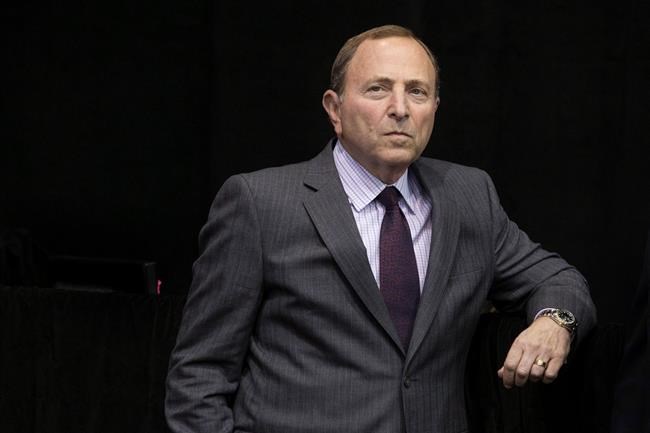Elevate your local knowledge
Sign up for the iNFOnews newsletter today!
Sign up for the iNFOnews newsletter today!
Selecting your primary region ensures you get the stories that matter to you first.

TORONTO – Black-and-orange T-shirts with the crest of Team North America line the Air Canada Centre gift shop, while the patchwork Team Europe lines up on one side of the World Cup of Hockey final.
Both of the experimental teams were big successes in Toronto, but neither may exist when the next tournament rolls around.
Though the tournament will live on, the NHL and NHLPA have yet to decide what the event will look like down the line or even when it will occur.
“We will each take a deep breath,” NHL commissioner Gary Bettman said this week, “let our respective troops recover and will then debrief and get together and talk about what it is we think went well, what it is we think maybe we can do better, what it is maybe we should do different and start planning out the future.”
“The first time you do something there are always long lists of things you’d like to do better and hopefully you perfect it over time,” NHLPA executive director Donald Fehr said in a separate interview.
What the World Cup has not proven to be is a replacement for the Olympics, if that was ever even the hope.
Mike Babcock, the two-time gold medal-winning head coach for Canada, has long professed his belief that the World Cup could never replace the Olympics. Part of his thinking stems from the inclusion of concept teams like Europe, which remove the country-on-country tension of true best-on-best competitions.
The European squad even competed without an anthem because players said a tune created from scratch would offer nothing with regard to national pride. The opener of the final between Canada and Europe offered none of the usual intensity of an Olympic gold medal match.
While Babcock praised the World Cup earlier this week, he also said: “It’s not the Olympics. Let’s not get confused.”
Fehr said the World Cup was never thought of as a replacement for the Olympics.
“This is the ‘let’s go do the best thing ice hockey’s ever done on an international scale’,” he said.
Fehr also argued that the competition level was higher, on balance, than the Olympics.
Both the NHL and the NHL Players’ Association contend that the competitiveness was high in Toronto — perhaps the best ever — but while many of the games were close in score, the World Cup itself lacked tension. Canada entered as the overwhelming favourite and has proceeded to roll through everyone. Even the Canadians’ worst offering was enough for a two-goal win in the first game of the final.
That may be a cyclical reality though with threats from Finland, the United States and Sweden all undergoing some kind of evolution.
Bettman said the future of the two concept teams hadn’t been determined, but it’s apparent Europe will be a one-and-done entity. It’s conceivable that a qualifying tournament determines the final two spots moving forward.
Ignoring the buzziest team of the tournament for future events will prove challenging, though.
Loaded with five of the past six No. 1 overall picks, including Auston Matthews and Connor McDavid, North America was the most intriguing aspect of the World Cup by far.
Babcock said the North Americans were “spectacular” but wondered about the feasibility of the group down the line, especially if McDavid and Matthews played for their respective countries next time around. Would a future squad offer the same excitement?
It’s uncertain, too, if McDavid and Matthews will be exempt from having to represent North America again. McDavid has already said he hopes to play for Canada and not North America at the next event.
“We want to get this tournament concluded successfully before we kind of sit down and talk about what the future looks like,” NHL deputy commissioner Bill Daly said.
North America was the top draw. Three of the four highest-attended games thus far included the 23-and-under squad from Canada and the United States; a preliminary round tilt between the U.S. and Canada set the high-water mark at 19,106.
Official attendance hovered just below 19,000 for most games, but empty seats and boxes were more norm than exception, especially during afternoon games. One game between the Czechs and Europe drew less than 9,000 fans.
Even important games between rivals didn’t lure a full house. A Saturday night semifinal between Canada and Russia, old rivals, drew 19,021, less than four preliminary-round games. The first game of a buzz-starved final drew even less (18,377).
Babcock suggested housing the tournament in two different cities to eliminate those sparsely-attended afternoon affairs (which do benefit international television viewing), an idea Fehr said was worth considering. Daly said bids might be considered for future hosting cities.
The tournament’s timing will also require further discussion with February lingering as another possibility. There would be less competition for eyes certainly at that point, Fehr said. The fall season sees the NFL and college football seasons just getting going and Major League Baseball in midst of the stretch drive.
Bettman said “it’s safe to say” there will be future World Cups but the league and PA hadn’t determined when the next event would run. The two sides are also in discussions about a Ryder Cup-style event that would pit Europe against North America.
“Do I think we’ll see it soon?” Fehr said of that concept. “All I can tell you is it’s one of the things, along with some others, that are on the table for some discussion. But I think it’d be really interesting to see it.”
This site is protected by reCAPTCHA and the Google Privacy Policy and Terms of Service apply.
Want to share your thoughts, add context, or connect with others in your community?
You must be logged in to post a comment.